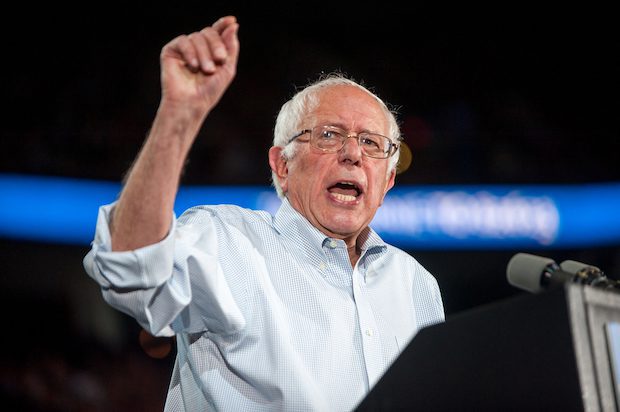Fear Of Bernie Sanders

Thomas B. Edsall’s column this week features candid comments from members of the Democratic establishment, expressing their fear of Bernie becoming the party’s nominee. Excerpts:
The answers I got from Democrats who make their living in politics revealed considerable wariness toward Sanders — the response many Sanders supporters would expect.
“Point 1, I am very worried about Bernie. Socialism is a problem word,” a Democratic operative with ties to the party establishment said:
Sure he has a “stick it to the elites” message that could explain it, but it’s a problem. Point 2, Democrats are doing very well in the suburbs. Bernie could threaten that shift with an economic frame that is just too much for them. He could become a huge problem in the suburbs of Atlanta, Charlotte, Denver, Orange County, etc. where the key Senate and House races will take place.
“Bernie is one Democrat who probably cannot win,” said a second operative:
I worry about his style for swing women voters. His proposals are good and have agenda-setting strength. I think his language of no alternative-no compromise-socialist will spook too many voters.
In the most important election in the lifetime of many Democrats — with Trump poised for a second term — the electability of the Democratic nominee is the top concern.
There’s a lot of good stuff in there, including on-the-record comments from economists and others. The problems they see with Sanders are, in general:
- He’s completely unrealistic on economics — spend, spend, spend
- He really is a socialist, which is going to alienate a lot of people (older voters, suburban voters)
- He has a kooky 1960s past
Did you know Bernie was a hippie Sexual Revolutionary? No kidding. From Salon:
While nearby hippies were hoeing vegetable beds, canning tomatoes, and otherwise getting back to the land, Sanders went back to the typewriter. In his ramshackle farmhouse on a dirt road outside Stannard, he spent hours banging out rambling essays on subjects ranging from cancer and public education to the sexuality of children.
Drawing on the teachings of Wilhelm Reich that he had embraced in college, he argued in an essay for the Freeman that cancer may be caused by emotional distress. That was especially the case, he wrote, with breast cancer, which he attributed to sexual repression of young girls, referring often to The Cancer Biopathy, Reich’s 1948 book that proposed a direct link between emotional and sexual health, in particular the dire consequences of suppressing “biosexual excitation.” Reich had patented the Orgone Box, with which users could enhance their orgasms, the better to ward off cancer. The Food and Drug Administration had banned the interstate shipment of the boxes and jailed Reich when he violated the ban. He died in jail in 1957.
At twenty-eight Sanders knit Reich’s ideas into his fully formed philosophy, conflating health and cancer with sex and social mores. “How much guilt, nervousness have you imbued in your daughter with regard to sex?” he asked in his essay.
If she is 16, 3 years beyond puberty and the time which nature set forth for childbearing, and spent a night out with her boyfriend, what is your reaction? Do you take her to a psychiatrist because she is “maladjusted,” or a “prostitute,” or are you happy that she has found someone with whom she can share love?
Are you concerned about HER happiness, or about your “reputation” in the community?
How much would that kind of thing matter in a presidential campaign? I’m not confident that anyone knows. On paper, Sanders should be a loser. On paper, so was Trump in 2015. Is there anything Crazy Bernie did in his past that’s more unsettling than things Donald Trump has done? Bernie circa 1970 writing about the Reichian sexual utopia is crackpot, but Trump was on tape advising a young stud to “grab ’em by the p*ssy,” and he was still embraced by religious and social conservatives.
In Edsall’s column, the experts see Bernie as having particular strengths. Young voters love him. He’s strong with the grassroots. And
A third advantage Sanders brings is the appeal of his anti-corporate, anti-rich message to a segment of populist Trump voters — those who backed Sanders in the 2016 primaries and shifted to Trump in the general election.
I think that is the wild card here. Trump showed that you could be a wildly unconventional outsider, a candidate with a highly compromised past who proposed things that could never be politically workable — and still win the White House, on the strength of people being fed up with the status quo.
People who say Bernie can’t win need to go back and read things that all the smart people (and even half-smart people like me) were saying about Trump early in the GOP primaries. He can’t win them, and even if he does, there’s no way he can beat Hillary. After Trump, never say never — not even about a grumpy old New England socialist.